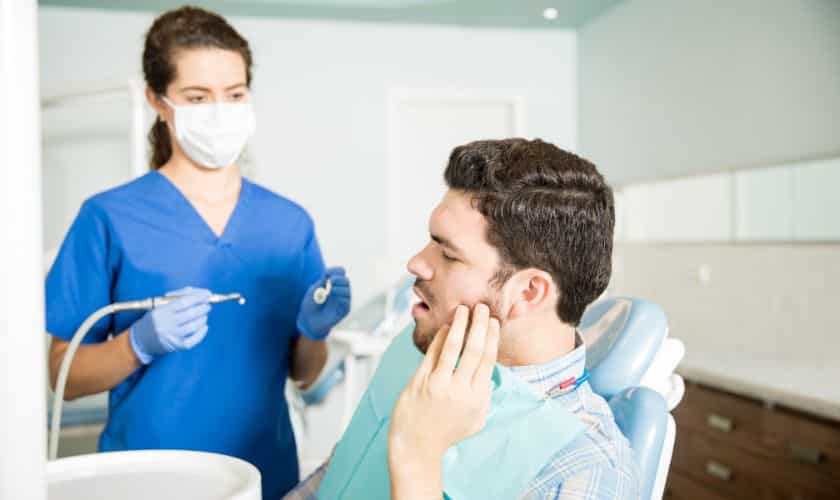Published on July 26, 2023

Maintaining good oral health is key to preventing dental emergencies and ensuring a healthy smile. Dental emergencies, such as toothaches, broken teeth, or infections, can be painful and disruptive. Fortunately, many dental emergencies can be avoided with proper preventive care. In this blog, we will explore essential tips and strategies to help you maintain optimal oral health and reduce the risk of dental emergencies. From practicing good oral hygiene habits to scheduling regular check-ups with your dentist, we’ll cover practical steps that you can incorporate into your daily routine to safeguard your teeth and gums and enjoy a healthy and pain-free smile.
Tips for Preventing Dental Emergencies
Here are some essential tips for preventing dental emergencies:
1. Practicing Good Oral Hygiene: Brush your teeth at least twice a day and floss daily to remove plaque and prevent tooth decay and gum disease.
2. Maintaining a Healthy Diet: Limit sugary and acidic foods and drinks that can erode enamel and lead to cavities. Instead, include teeth-friendly foods like fruits, vegetables, and dairy products.
3. Avoiding Harmful Habits: Quit smoking and tobacco use, as they can increase the risk of oral health problems. Additionally, try to reduce teeth-clenching and grinding, which can damage your teeth and jaw.
4. Wearing Protective Gear: If you participate in sports or physical activities, use a mouthguard to protect your teeth from impact injuries.
5. Regular Dental Check-ups and Cleanings: Visit your dentist for routine check-ups and cleanings to catch any potential dental issues early and maintain optimal oral health.
6. Creating an Emergency Dental Kit: Prepare a kit with essentials like gauze, pain relievers, and a small container to store a knocked-out tooth for preliminary emergency dentistry.
By following these preventive measures, you can significantly reduce the risk of dental emergencies and enjoy a healthy and pain-free smile for years to come.
Dental Emergency Preparedness
Dental emergency preparedness involves being ready to handle unexpected dental issues effectively. Here are some steps to ensure you are prepared for dental emergencies:
1. Create an Emergency Dental Kit: Assemble a kit with essentials like gauze, a small container, pain relievers, and a cold pack. Keep it easily accessible at home and when traveling.
2. Know What to Do in an Emergency: Educate yourself and family members on immediate actions to take for common dental emergencies, such as a knocked-out tooth, severe toothache, or a broken dental restoration.
3. Contact Emergency Dental Services: Save the contact information of emergency dental clinics or your dentist’s after-hours contact number. Be prepared to seek professional help when needed.
4. Regular Dental Check-ups: Prevent emergencies by attending routine dental check-ups and cleanings to address potential issues before they escalate.
5. Be Cautious During Activities: Be mindful of your dental health during sports or other activities. Use mouthguards when playing contact sports to protect your teeth from injuries.
By taking these preventive measures and being prepared for dental emergencies, you can ensure a swift and appropriate response, minimizing potential damage and discomfort.
Developing Healthy Oral Habits for the Whole Family
Developing healthy oral habits for the whole family is essential for maintaining excellent dental health. Here are some tips to promote healthy oral hygiene practices:
1. Brush Twice a Day: Encourage everyone in the family to brush their teeth twice a day for at least two minutes each time. Use fluoride toothpaste and soft-bristled brushes.
2. Floss Daily: Teach children and adults the importance of flossing daily to clean between teeth and remove plaque and food particles.
3. Limit Sugary Snacks and Drinks: Reduce the consumption of sugary snacks and drinks, especially between meals, as they can lead to tooth decay.
4. Drink Plenty of Water: Drinking water helps wash away bacteria and food particles, promoting a healthy mouth.
5. Regular Dental Check-ups: Schedule routine dental check-ups for every family member to detect and address dental issues early.
6. Set a Good Example: Be a role model for your children by practicing good oral hygiene yourself.
7. Use Mouthguards: If family members play sports or participate in activities with a risk of dental injuries, wear mouthguards for protection.
By establishing these healthy oral habits as part of your family’s daily routine, you can ensure everyone enjoys strong, healthy teeth and gums for a lifetime.
Source : Harvard School of Dental Medicine
In conclusion, developing healthy oral habits for the whole family is vital for maintaining optimal dental health. By consistently brushing, flossing, and attending regular dental check-ups, you can prevent dental issues and ensure a beautiful smile for everyone. Encourage good habits from an early age and lead by example to instill a lifelong commitment to oral hygiene. By prioritizing oral health, your family can enjoy the benefits of strong teeth and gums and reduce the risk of dental emergencies and discomfort in the future.
